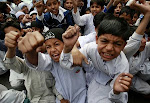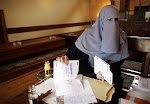The West African country of Niger has been found guilty of failing to protect a woman sold into slavery.
A court has ordered the Niger Government to pay the woman $32,000.
Hadijatou Mani was just 12 years old when she sold to a man, who forced her to perform domestic and agricultural work.
She served him for 10 years and also became his sex slave, bearing him children.
"My master has four wives. We the slaves were doing all the housework like cooking, fetching water and firewood. I was beaten so many times."
Ms Mani accused the Niger government of failing to protect her from slavery, which was criminalised five years ago.
Her lawyer, Ibrahim Kane, says the judgement will bring hope to other slaves.
"There are thousands and thousands of slaves in Niger who will be today relieved to hear that you know the practice of slavery in this country is not allowed," he said.
Anti Slavery International estimates there are still at least 43,000 slaves in Niger.
12 years ago





















